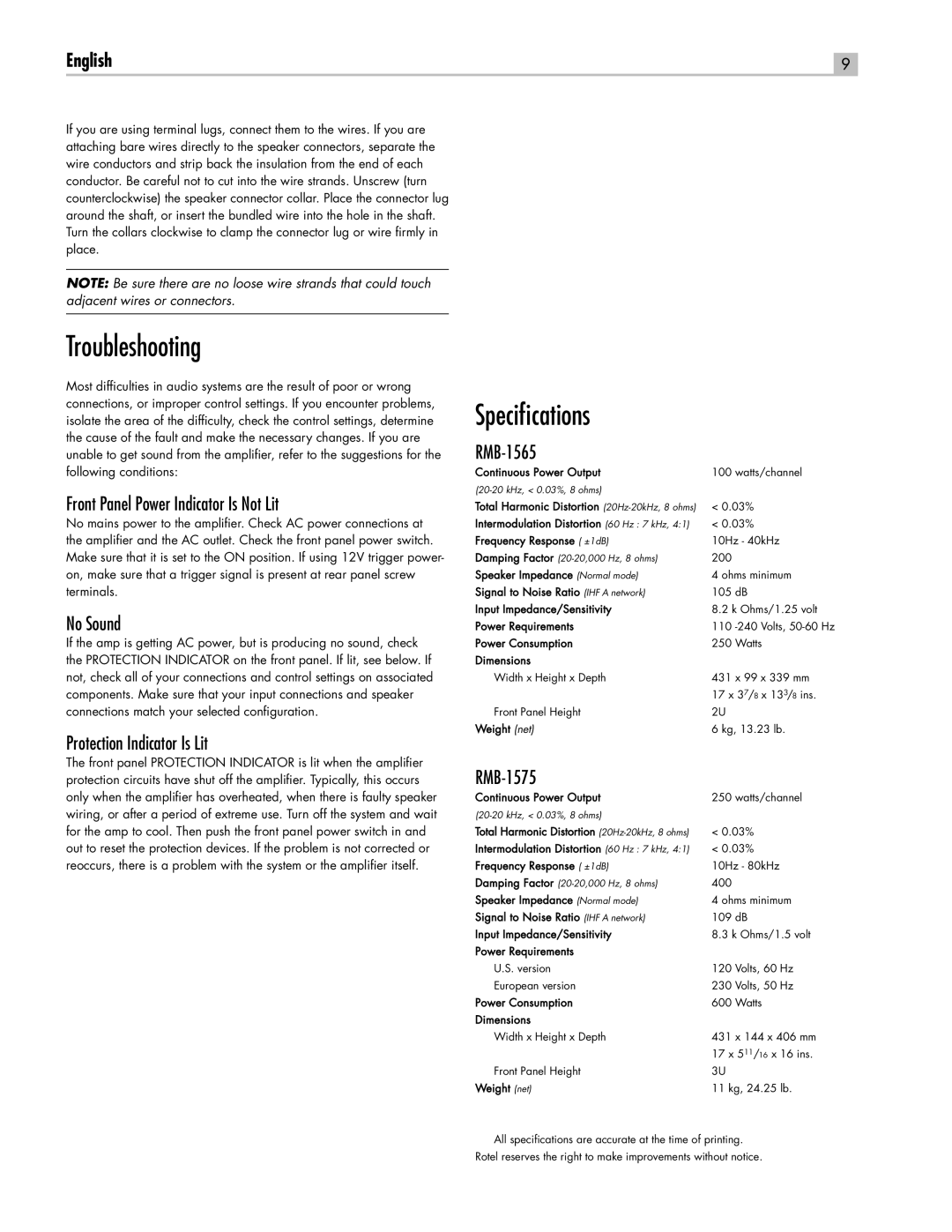English | 9 |
If you are using terminal lugs, connect them to the wires. If you are attaching bare wires directly to the speaker connectors, separate the wire conductors and strip back the insulation from the end of each conductor. Be careful not to cut into the wire strands. Unscrew (turn counterclockwise) the speaker connector collar. Place the connector lug around the shaft, or insert the bundled wire into the hole in the shaft. Turn the collars clockwise to clamp the connector lug or wire firmly in place.
NOTE: Be sure there are no loose wire strands that could touch adjacent wires or connectors.
Troubleshooting
Most difficulties in audio systems are the result of poor or wrong connections, or improper control settings. If you encounter problems, isolate the area of the difficulty, check the control settings, determine the cause of the fault and make the necessary changes. If you are unable to get sound from the amplifier, refer to the suggestions for the following conditions:
Front Panel Power Indicator Is Not Lit
No mains power to the amplifier. Check AC power connections at the amplifier and the AC outlet. Check the front panel power switch. Make sure that it is set to the ON position. If using 12V trigger power- on, make sure that a trigger signal is present at rear panel screw terminals.
No Sound
If the amp is getting AC power, but is producing no sound, check the PROTECTION INDICATOR on the front panel. If lit, see below. If not, check all of your connections and control settings on associated components. Make sure that your input connections and speaker connections match your selected configuration.
Protection Indicator Is Lit
The front panel PROTECTION INDICATOR is lit when the amplifier protection circuits have shut off the amplifier. Typically, this occurs only when the amplifier has overheated, when there is faulty speaker wiring, or after a period of extreme use. Turn off the system and wait for the amp to cool. Then push the front panel power switch in and out to reset the protection devices. If the problem is not corrected or reoccurs, there is a problem with the system or the amplifier itself.
Specifications
RMB-1565
Continuous Power Output | 100 watts/channel |
| |
Total Harmonic Distortion | < 0.03% |
Intermodulation Distortion (60 Hz : 7 kHz, 4:1) | < 0.03% |
Frequency Response ( ±1dB) | 10Hz - 40kHz |
Damping Factor | 200 |
Speaker Impedance (Normal mode) | 4 ohms minimum |
Signal to Noise Ratio (IHF A network) | 105 dB |
Input Impedance/Sensitivity | 8.2 k Ohms/1.25 volt |
Power Requirements | 110 |
Power Consumption | 250 Watts |
Dimensions |
|
Width x Height x Depth | 431 x 99 x 339 mm |
| 17 x 37/8 x 133/8 ins. |
Front Panel Height | 2U |
Weight (net) | 6 kg, 13.23 lb. |
RMB-1575
Continuous Power Output | 250 watts/channel | |
|
| |
Total Harmonic Distortion | < 0.03% | |
Intermodulation Distortion (60 Hz : 7 kHz, 4:1) | < 0.03% | |
Frequency Response ( ±1dB) | 10Hz - 80kHz | |
Damping Factor | 400 |
|
Speaker Impedance (Normal mode) | 4 ohms minimum | |
Signal to Noise Ratio (IHF A network) | 109 dB | |
Input Impedance/Sensitivity | 8.3 k Ohms/1.5 volt | |
Power Requirements |
|
|
U.S. version | 120 | Volts, 60 Hz |
European version | 230 | Volts, 50 Hz |
Power Consumption | 600 | Watts |
Dimensions |
|
|
Width x Height x Depth | 431 x 144 x 406 mm | |
| 17 x 511/16 x 16 ins. | |
Front Panel Height | 3U |
|
Weight (net) | 11 kg, 24.25 lb. | |
All specifications are accurate at the time of printing.
Rotel reserves the right to make improvements without notice.
